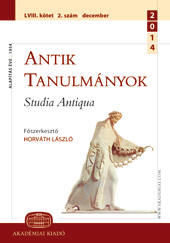A bölcs Iuvenalis és a neolatin bukolika
Wise Juvenal and the Neo-Latin Pastoral Poetry
Author(s): Lajos Zoltán SimonSubject(s): Christian Theology and Religion, Cultural history, Poetry, Other Language Literature, 15th Century, Theory of Literature
Published by: Akadémiai Kiadó
Keywords: pastoral poetry; Roman satire; Neo-Latin poetry; humanist commentary; Juvenal; Persius; Vergil; Baptista Mantuanus; Caspar Tribrachus; Faustus Andrelinus; Jodocus Badius;
Summary/Abstract: This study analyses the bucolic poems of three humanist poets of the 15th century, Caspar Tribrachus, Baptista Mantuanus and Faustus Andrelinus, whose eclogues are characterized by both a realistic mode of depiction utterly differing from the idealized landscape of the pastoral and the influence of Roman satire. Although in the case of Mantuanus several allusions had already been noted by his contemporaneous commentator, Jodocus Badius, except for the obvious inspiration of Eclogue 5 by Juvenal, little attention has been devoted to the allusions to Persius and Juvenal by recent research. Th e analyses aims at a more thorough examination of this influence, dealing not only with the imagery and the vocabulary of the eclogues, but also with imitations of idyllic pictures from the satirists, as well as with the cases of double imitation, where the allusions to satire simultaneously parody classical passages of Vergil. Further, the important role of both Juvenal’s Umbricius and the medieval commentaries on Juvenal in the forming of Umber, the key figure in Mantuanus ’ eclogues, shall be pointed out. Finally, on the basis of the theoretical background of the two genres and their possible interrelations, it shall be argued that the satire played a decisive role in the establishment of this new variant of pastoral poetry, which is realistic in its imagery and didactic in its intention.
Journal: Antik Tanulmányok
- Issue Year: 60/2016
- Issue No: 2
- Page Range: 187-204
- Page Count: 18
- Language: Hungarian
- Content File-PDF

